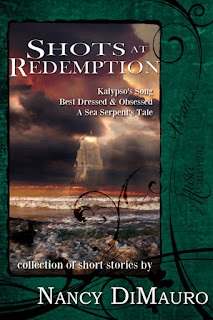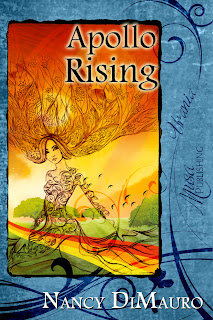Welcome to my site and the Spectrum of Speculative Fiction Blog Hop. Thank you so much for stopping by.
I write fantasy. Even when I try not to. My stories tend to bend in unexpected ways to have a fantasy flavor to them.I don't always do it on purpose. Sometimes the fantasy elements just grow organically like daisies popping up in the spring. So, I write murder mysteries set in a futuristic Washington, DC with a psychic detective, or coming of age stories with magic.
In setting up this blog hop. Peter asked us to write about what we write and why we write it. I'm not sure I ever really thought about it before he asked. When I was very little, I liked fairy tales and fantasy stories. The first book I remember reading myself was Magic Elizabeth. I loved the make believe world of Bridge to Terabithia. Then fantasy became the stuff for little kids and I graduated to the books my older brother was reading - horror by Stephen King. I was too cool (says the geek) to read fantasy any more. I rediscovered fantasy in college when one of the actors in the show I was working handed me a copy of The River of the Dancing Gods by Jack L. Chalker. I was hooked. Again.
But why?
In fantasy and science fiction, we make the world the way we want it to be. These genres let us explore political and cultural mores in a safe way. The original Star Trek explored racial issues and the related tension during the 60's with the episode Let This Be Your Last Battlefield, featuring an ongoing racial war between two groups of aliens, one with black skin on the left side of their bodies and white on the right, and the other with white on the left and black on the right, and Plato's Stepchildren which featured the first interracial kiss on American television.
There's a greater ability to explore what makes us human in fantasy and science fiction than in any other genre. Romance focuses on a narrow spectrum of human emotion:love, lust and desire. Murder mysteries and thrillers explore the depravity of the human condition. What makes people do the horrible things they do?
In fantasy, we have the ability to explore all these issues. Fantasy stories evoke wonder. They take us to new worlds. And in the best of them, they show us a bit about ourselves. I think that's why my stories tend to take turn down this road. Hopefully, you'll enjoy the trip with me.
Now the fun part; this is your chance to join me down the roads I travel.
The Contest:
I'm giving away a copy of my e-book short story collection, Paths Less Traveled, to one lucky reader. To enter all you need to do is comment on this post, and follow me on on Twitter.
Blurb:
Sometimes finding Justice means finding yourself.
Some women walk their own paths through the ages, even when
mayhem follows. Follow two of these women as they each walk the Paths Less
Traveled.
In “Lightning Strikes”, Falcon, a disinherited princess, wants to be the king’s spy. The theft of a prize stallion is her chance. But when her best friend stands accused, far more than her dreams are at risk. Falcon races to catch a thief before fatal vengeance falls on an innocent man.
Worlds away, Psyonics Corporation controls all paranormals and psychics in “Flashes of Life.” Its highest-testing but still latent psychic, Vonna accepts an assignment with the D.C. police to avoid the company’s breeding program. The company works to ensure failure in her first case – a homicide. If she can’t unlock her talents, a murderer will go free and she’ll be consigned to slavery.
The Paths Less Traveled. Strange universes. Kick-butt heroines.
In “Lightning Strikes”, Falcon, a disinherited princess, wants to be the king’s spy. The theft of a prize stallion is her chance. But when her best friend stands accused, far more than her dreams are at risk. Falcon races to catch a thief before fatal vengeance falls on an innocent man.
Worlds away, Psyonics Corporation controls all paranormals and psychics in “Flashes of Life.” Its highest-testing but still latent psychic, Vonna accepts an assignment with the D.C. police to avoid the company’s breeding program. The company works to ensure failure in her first case – a homicide. If she can’t unlock her talents, a murderer will go free and she’ll be consigned to slavery.
The Paths Less Traveled. Strange universes. Kick-butt heroines.
Excerpt:
The blonde female officer growled as I bent to slide under the yellow police tape. Her aura flicked with the burnt amber of authority and a hint of annoyance. Her jaw snapped shut as she took in my white leather outfit and gloves, the outward sign of my other than human status. Silver surprise limed her before changing to puce and signaling her disgust. Her gaze flicked to the emblem bearing the Greek letter Psi on my chest, and then skittered away.
"A pleasure to meet you Officer Williams. I'm Vonna Sinya, the assigned Psionic . Detective Muller is waiting for me."
Williams tapped her commlink and turned her back.
"The Charlie's here," Williams whispered.
Charlie-short for charlatan.
The word burned across my skin. It’s what the insens called psychics despite the scientific proof of our existence. I drove my fingernails into my palms. The white leather gloves only transferred the barest pressure to my hand. Recently graduated from Psy Corp, the gloves were a new addition to my wardrobe.
The gloves chaffed.
Muller strode briskly toward me. "Let her pass," he said as he approached. "Ms. Sinya, nice to meet you." He looked down at his hand, and then dusted it off on his pants before extending it.
Touching a psychic was the equivalent of offering your throat to a hungry vampire. The corners of his eyes tightened making the three crow's feet under each one stand out from his skin. He wasn't as sanguine about his offer as he'd like me to believe. He knew psychics were a threat even when smothered in leather. Maybe especially then. Still, the alpha dog was offering me a place in the pack and hoping I didn't challenge his authority.
I pasted a smile on and grasped his hand. "It's a pleasure to meet you. Please call me, Vonna."
"Rick." He lifted the tape. "First murder?"
I ducked under the line separating cops from little people. "My first crime scene."
He shifted a step back. "Why do I get the newbies?"
"Because you're willing to shake hands with us?"
The change in his mood was so rapid that his bark of laughter and bright blue slash of humor startled me.
"That may be it." He walked toward the house. His pace was half the speed of his departure. "Main talent?"
A rash of heat flamed across my features. "We don't know."
Muller stopped and turned. "The Company does not let unknown psionics wander the streets, much less join active investigations. It's not like I just asked your favorite sexual position."
The Company was a pejorative term for Psy Corp. I'd heard it referred to an ancient song about owing your soul to the Company you worked for. If so, it wasn't a misnomer.
"I'm a thirty-seven."
"Excuse me?" Muller went pale in the flashing blue lights.
Despite the pit in my stomach at what might await me in the house, I smiled. "Just realize what you'd given your hand to?"
- * * *
Check out the other great writers on the hop (and their give aways):







